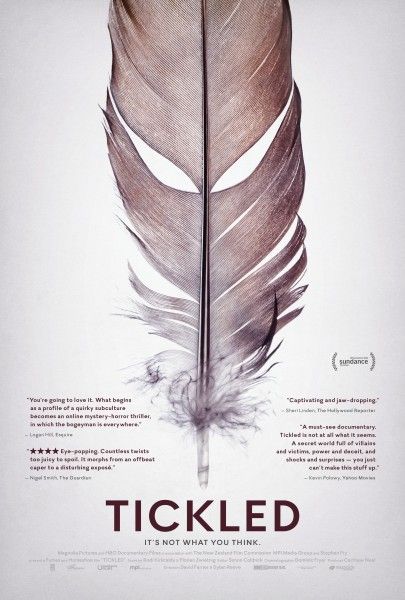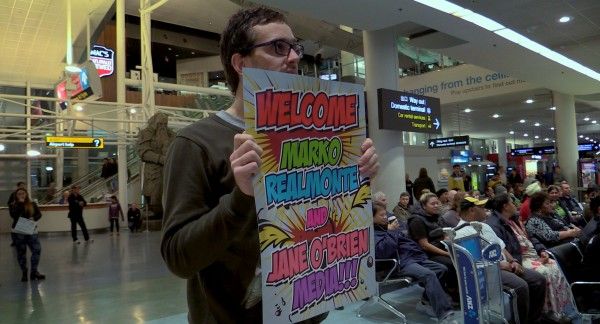Tickled is one of the year’s best films and it’s one more people should be talking about. For those of you who are unfamiliar with the documentary, it follows reporter David Farrier and his producer Dylan Reeve as they investigate the world of competitive tickling. But what originally sounds like a fun, silly story takes a turn into a dark, twisted world of blackmail and secret identities.
I got the chance to interview Farrier and Reeve a couple weeks ago, and this interview is for people who have seen the movie and have further questions about it. So if you haven’t seen Tickled, go check it out on VOD right now, come back, and then read this interview. We talk about reaction to the film, the legal threats they’ve received, controversial scenes, Internet culture, and much more.
So what I want to start off by asking you guys when did you realize we have enough material here for feature length documentary?
DAVID FARRIER: We always had a plan for something longish initially it was probably gonna be like a 60-minute kind of thing that we thought we’d put on Vimeo. That was when we started with our Kickstarter campaign but quite quickly once we filmed that first thing we realized that we didn’t have a full grasp on what we were doing. There were more people we needed to talk to about what we were doing. The story was bigger than we thought and I think that’s when we sort of came back and realized that there was something more significant but also frustratingly that we didn’t have the resources at that point to chase it that we had to convince other people that their was a feature film to be had.
And how did those conversations go I mean how did you sort of get people on board with this fascinating story?
FARRIER: I think I mean it was the good thing was it was kind of easy to get people on board in the fact that it was all unfolding around us currently. I mean we told people you know we discovered this tickling competition online and it all seems innocent and but then you know the second we started poking around things sort of got very intense and you know there were lawyers involved and immediately had that incredibly light hearted topic that suddenly you know sort of in need for investigation we started we started to do with our blogs sort of writing about it originally it had this huge pushback and I thought that was quite intriguing for people and they were drawn into that story quite quickly. So I think that was an advantage for us as far as being able to get people on board it was a really riveting strange enticing thing.
DYLAN REEVE: And that we were trapped in the middle of it.
In both his real and fake personas David D'Amato has lobbed legal threats at you guys throughout the film and afterwards. Has any of those legal threats eve come to anything?
FARRIER: Two of them were filed, there were two lawsuits filed in the U.S. courts by David D’Amato himself they were both information lawsuits. But they haven’t come to anything because those two were essentially voluntarily dismissed because they were good reason to challenge under the jurisdiction, but we were told they’d be refiled but we but we have not seen that happen yet but it’s certainly possible at any moment.
When the first threats started coming in was there anything that made you think that the threats might be coming from a man impersonating a woman?
REEVE: I think some of the language in some of the language used was very strange and I think yeah we were questioning things early on whether they were from a “Jane” or a “Debbie” that just the language used did seem...I don’t know how to explain it but it didn’t seem like the sort of language that a female would write and the emails in general just got more and more crazy. So there were certainly doubts in our minds early on but nothing particularly concrete.
FARRIER: I think we probably both thought that they were definitely fake personas involved but it wasn’t clear whether they were all in one person or whether they you know they were three or four people using a few names each or whether it was real people just with fake names. I think all of it was a little bit unclear and we kind of bounced back and forth between different theories as we found new things and as our paranoia grew perhaps.
Was there anything that either one of you had particularly encountered that sort of would’ve clued you into these sort of fake online personas or was it just sort of your journalistic instincts that clued you into what was going on?
FARRIER: I mean I think everyone in today’s world is pretty across the idea that not everyone is who they say they are on the Internet, and Dylan and I both spend a lot of time online and have probably encountered a lot of not quite to this degree but as we have mentioned but I have encountered people who are not who they say they are on the internet but it hasn’t been such kind of deviously. So I don’t know if it’s about journalistic prowess but just you get a feeling for that when you’re on the internet long enough that you know oh gosh this is not quite what it seems.
REEVE: And then it’s the idea that you sort of always maintain just a little bit of skepticism. I mean some people are incredibly skeptical of everyone on the internet and some people are very trusting and I like to believe good things but just keep the idea that maybe it’s not what it seems.
FARRIER: Yeah, I mean and part of what was so confusing early on what was real and what wasn’t and we got this podcast The Dollop covered our original postings on it and you can just listen to that original podcast and kind of listen to how confused we were and they were about our story and we actually got The Dollop guys to come and do the audio commentary for the film, which were releasing with the digital version. So we kind of played the movie to them and so they could see what actually happened because they did this podcast a couple of years ago it was just out of confusion, you know we thought David Starr was a figment of someone’s imagination and we thought that possibly we was David D’Amato and it was so much confusion. So it was kind of interesting listening to that, you know we wanted to make the commentary something a bit different that’s sort of fascinating. Getting these guys who had heard about the story early on but had a very different idea of what was actually happening it was kind of amazing hearing their reactions as they saw the film for the first time.
Speaking of the reactions, as you’ve taken the film around to festivals and shown it to audiences have the reactions to the film surprised you or are they pretty much in line with what you expected them to be?
REEVE: My favorite surprising reaction to the film and it’s happened goodness maybe more than half a dozen times now I reckon between the two of us is someone comes up to us after the film to us and says, “Oh this is a bit weird but I was watching the film and I sort of started to feel something and I realized that I was a little bit turned on and so now you’ve helped me discovered that I have a little bit of a tickling fetish.” Probably five or six people have come up to us after a film and said that to us, and so I’m like if I extrapolate that out to how many films we’ve been to we must’ve uncovered a fetish for hundreds of people by now.
FARRIER: Yeah I think that was quite surprising and I think the other thing is quite a few people are absolutely convinced that this whole thing is made up and it’s just narrative fiction. So people are to the point that they are arguing that maybe you know all this is shot too well this can’t be a documentary, this sounds like a humblebrag. But you know people are just mystified at how this could be real and they say that we made up all the websites around it and that this is just a big long con. So I’ve found people pulling a similar pattern that way sort of seeing people’s sartorial minds unfolding has been quite surprising.
REEVE: And a lot of them get so angry about it they get really angry and defensive.
FARRIER: Oh yeah, angry that we have tricked them. Yeah, furious.
REEVE: But they’re angry that other people can’t see it. They’re like “No, you idiot it’s clearly fake!”
Well I think that sort of saying that this is all fake is maybe sort of a defense mechanism against the truth of the matter, which is going into what you said is that people aren’t who they say they are online and that you know you can build up something that can trick people so easily.
FARRIER: And I mean that’s the thing because you know everyone we’re all savvy to the fact that people are gonna be catfished online and stuff. I think people forget to the degree to trick you and that’s why a lot of these young men get drawn into this world of competitive tickling. I’m sure a lot of these guys know that people aren’t who they say they are online but you know if I make the game convoluted enough you can still suck people in and I think that’s quite a big take away of this for me.
One of the interesting things about this film is the balance between the comical and the creepy, and I was curious of how conscious you guys were of striking that balance?
REEVE: There’s an interesting thing that I find when I watch the film is that it’s actually a remarkably good kind of mirror of what, we went through it for a much longer period, but it’s a really good mirror of the experience that we went through. There were times when things were just you know absurdly hilarious to us and there were times when they were really creepy and intimidating and I think the way the film was put together does a really good job of kind of conveying that. I think when you kind of watch the film you sort of go through in the process of 90 minutes you go through a lot of the same sort of thought processes and emotions and sort of experiences that we went through making it and I’m quite proud of how well it seems to do that.
There’s one scene in particular that sort of jumps out at me because it’s the scene where you guys are interviewing Richard Ivey and he shows you consensual tickling but it’s presented somewhat ominously, and I’m curious why you approach the scene in that way.
FARRIER: I think there was just wanting to do a bit of a sort of a turn around on the audience in a way because I mean we felt slightly uneasy going, well I felt slightly uneasy going into that situation because we were meeting with someone that we had just been communicating with online we were meeting there at his “tickle lair” and we wanted to sort of set up how we felt at the time, which was a bit unsettled and also to make the audience think “Oh, you know where are we going now?” But you know very quickly that flipped and becomes really whimsical and fun because you know pretty quickly you figure out that Richard’s the guy who’s incredibly open and kind and wants to let us into his world and reminds the audience that not everyone involved in tickling is necessarily doing it for these kind of devious means. Richard’s completely the opposite I mean he’s someone who’s out and proud and very clear about what he’s doing. So revealing that in that way I think is a bit more effective than just sort of keeping it; it gives it a bit of an edge I think.
REEVE: And I think also there’s a shot in that scene where it’s sort of a slow motion shot back to Richard with a sort of unusual expression on his face and I’ve seen a lot of people have read different things into that expression and make a lot of assumptions about why we used that shot and what we’re trying to say. Some people think it’s fetish shaming, some people think it’s creepy, some people think it’s a bit pervy and it’s funny because it’s a slightly neutral expression but to me it’s a quiet concentration or focus it’s a sort of rorschach that people will project something onto. I’m not sure what it is but it’s interesting because you say ominous and I don’t see anything ominous in that scene. I’ve seen other people who do say that and I don’t think we would deliberately try to paint tickling as ominous but just kind of precedes the fact that Richard really enjoys and has no shame about enjoying what he does and is really open about what it is and that is what that scene is to us but other people see different things, which is interesting.
FARRIER: The reason definitely is a little bit odd all these angels on the lawn and that his back sort of as he looks at the tickle chair and you know that’s just a little surprise and we get through there pretty quickly it like “Oh yeah, Richard’s cool. He loves tickling.”
I have to say this is one of the best documentaries I’ve seen all year and I was wondering if you know if the studio is gonna try and push to get a best documentary Oscar nomination or not?
FARRIER: I’m sure they’ll have a go. I don’t know it is such an incredible year for documentaries that if you look at even still just in the last month or two just some amazing things have come out. Amanda Knox I watched recently it was really quite impressive. So if they are it’s certainly a competitive field. I mean the success we’ve had with it so far and the interest it’s had has already outstripped our expectations by orders of magnitude I believe.
And I just wanna finish up by asking, is this a story that you guys see, as the legal threats keep coming, do you think this is a story that you’ll continue to pursue or have you guys moved on to other stories?
REEVE: I think we’re just keeping an eye on what happens as it unfolds. I mean we are documenting a few things as they happen but we don’t know where it’s gonna go but you know cause we didn’t know where it was gonna go originally so it could turn into more it could turn into nothing. So we’re just keeping an eye on what’s happening and we’ll go from there.





